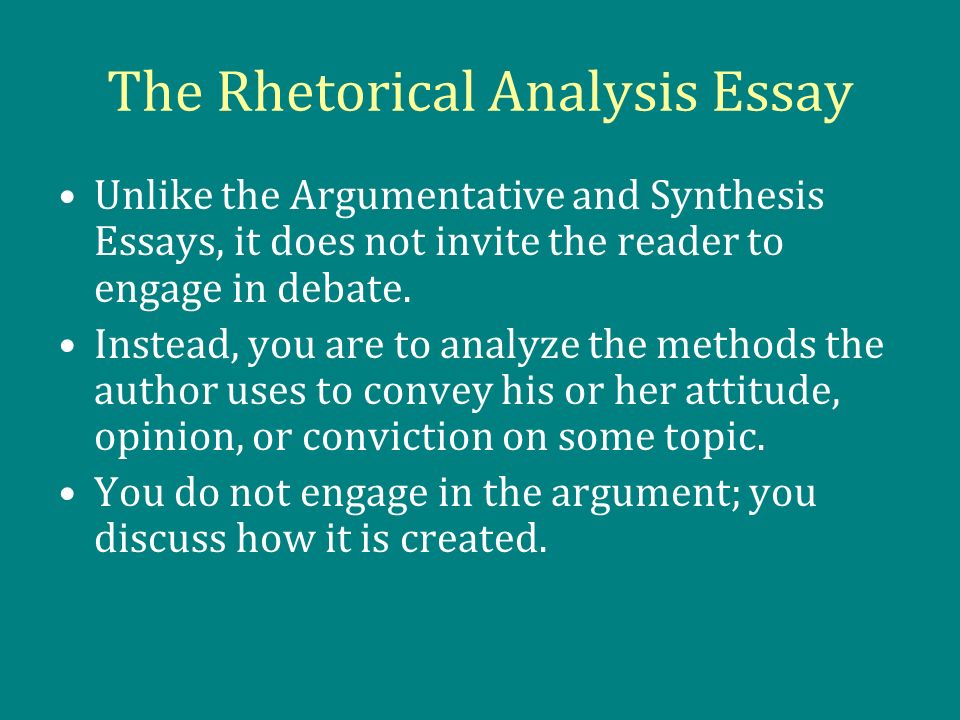
Rhetorical essay writing helps examine the author's intention and techniques rather than the information provided in the content. Writing is generally found in composition exams and AP English language and professional academics and students use them to analyze the texts written by the writer. Writing a rhetorical essay is considered very tricky, and the following article will be beneficial in providing the steps which can be filled to complete rhetorical writing.
Define Rhetorical analysis
A rhetorical essay helps examine how a writer provides the information in the content. Rhetorical analysis can be conducted on any type of visual or written content which can be used to persuade the audience. The primary rhetorical essay objective is to identify the writer's goals and the steps taken to achieve the desired goals while completing the work. A rhetorical essay needs to be more concerned with the information provided in the essay. Instead, it focuses on the composer's argument and the techniques used to make it in context. Different types of work can be examined with the help of rhetorical essay writing, which is
- A speech
- A scholarly article
- A novel
- A television show, film or play
- An art exhibit
- An advertisement or a cartoon
The rhetorical essay is generally used in academics provided in high schools and colleges as part of academic work.

Steps for writing a rhetorical essay
Gather information: Collecting information is considered one of the most important parts of conducting a rhetorical essay. To collect the relevant information, the SOAPSTone method can be beneficial. The method helps plan the analysis of the content. SOAPSTone consists of
- Speaker: The voice or the speaker narrating the story.
- Occasion: The place and time in which the writing takes place.
- Audience: the target audience for whom the writing is composed
- Purpose: The factors responsible for the writing and the goals of the writer
- Subject: The main context of the writing
- Tone: The way of writing the content.
Analyzing the appeals: The writers generally use appeals to make readers react to their writing and the information provided in the content. The appeals generally consist of the following:
- Ethos: These appeals are made to highlight the credibility of the writer. For instance, mentioning the qualifications of the author.
- Logos: These appeals are made in the form of facts and data, used to make an argument in the content.
- Pathos: These appeals are done to affect the readers emotionally, such as providing relatable facts about any crime scene.
Identification of the style of writing: These types of tools are used to gather reactions from the readers when they are reading the information provided by the writer. Some techniques are word order, word choice, repetition, tone, analogies, imagery, and figurative language.
Creating an analysis: Creating the analysis is an integral part of conducting rhetorical analysis. To create the, it is essential to answer some questions which will help in understanding the choice made by the writer and how they help support the writer's arguments during the preparation of the content. For caring about the analysis, it is necessary to focus on why and what the writer does. Some of the critical questions which are required to be answered when creating a rhetorical analysis are:
- What is the intention of the writer?
- Who is the audience of the writer?
- What is the argument?
- What strategy did the writer make to put their argument in the content and why?
- What kind of appeal did the writer make to convince the readers?
- What style is used by the writer?
- What is the impact of the writer on the audience?
Introduction: The introduction of the rhetorical essay should be clear and provide detailed information regarding the main topics discussed in the essay. The introduction should also contain a small background regarding the author, the relevance of the information provided and the main idea the content is trying to provide to the audience.
Preparing the thesis: The thesis statement should be provided at the end of the introduction and should be one word. The thesis statement helps in summarizing the argument made in the rhetorical essay regarding the strategies and choices made by the writer in the essay. The thesis is considered one of the most essential parts of the rhetorical essay.
Preparing the main body: The rhetorical essay should include three body paragraphs that should include different evidence for the essay. Each paragraph should provide information regarding a new topic in the essay. The paragraphs can be arranged in the form of appeals. Style of writing used by the author, chronology and efficacy used by the author. Each paragraph in the essay should be supported with facts, quotes and data instead of emotions and opinions. At the end of the paragraph, it is essential to link the information provided in the paragraph with the main topics of the essay.
Conclusion: When preparing the conclusion. It is essential to repeat the information provided in the thesis statement paraphrase and summarize all the main points discussed in the essay in a brief conclusion. Moreover, it is also important to showcase the relevance of the arguments made in the essay and provide a call for action in case it is required.
Essential tips for rhetorical analysis essay
- Being prepared: It is vital to practice rhetorical essay writing on different topics, favorite shows, books, blogs and movies. This helps improve essay writing skills and prepare strong essays during actual time.
- Correct format: The rhetorical essay is always prepared in the third person instead of the first person. Moreover, the essay should be written in the present tense, and it is essential to write it as commentary.
- Selecting the correct words: When preparing a rhetorical essay, it is essential to use strong verbs and words, which help provide a tone of analysis. The use of weak words results in creating an image of summarizing the facts. Moreover, it is also advisable not to use personal opinions in the essay.
- Strong finish: Providing a string finish helps create a long-lasting image in the readers' minds.


